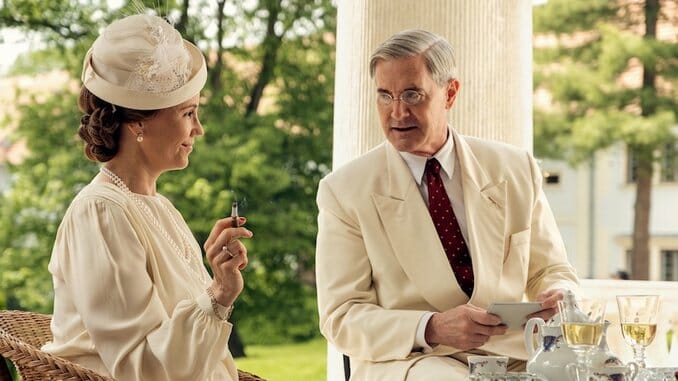Atlantic Crossing: Norway’s Royal Connection to FDR During WWII Gets a Sleepy Retelling on PBS
Photo Courtesy of PBS
There is no period of recent history more well-traversed than World War II. It continues to inspire fascination (good and bad) and exploration; from grandiose retellings to emotional, focused portrayals of individual survivors and victims, the films and TV programs that decide to set themselves within its tumultuous years never stop. And yet, there are still new stories to be told; the PBS and Norwegian co-production Atlantic Crossing is such a one. The eight episode series focuses on the little-known relationship between Norway’s Crown Princess Märtha (Sofia Helin) and U.S. President Franklin Delano Roosevelt (Kyle MacLachlan), and how it affected international policy before, during, and after the war.
This connection, however, is really the weakest part of the sleepy series, which feels like it could have easily been movie-length. There is so much initial promise in its first episode, too, which introduces us to Märtha and her husband, Olav, the Crown Prince of Norway (Tobias Santelmann) when they are on an American tour before the war. There they meet and get along splendidly with Roosevelt before heading back home—a home that was about to be invaded by the Germans.
As WWII stories go, Atlantic Crossing’s focus is more political and ideological than emotional. Norway has declared itself neutral in the war, mainly because it didn’t have the defenses to ward off German forces. But a failure to prepare for Hitler to ultimately breach Scandinavian neutrality had swift consequences. Quickly targeted as a strategic battleground between the United Kingdom and Germany, both in terms of its location and its processing of steel, a Nazi invasion swept through the Nordic countries: Denmark surrendered, Sweden ended up not-so-secretly siding with the fascists, and Norway and Finland mounted a limited resistance before being overtaken.
The exile of Norway’s royal family that defines the series is harrowing in that first hour; the German threat descends suddenly and without mercy, and the royals are scattered to the wind. King Haakon VII (Søren Pilmark) makes a decision to flee with Olav by his side, leaving Märtha and the children behind in the process. There are so many interesting considerations at play here; King, country, duty, family (more or less in that order). Mostly the early episodes are defined by Olav doggedly following his father from place to place, worrying that Norway isn’t being protected and that it might not even end up existing after the war. Märtha and the children, meanwhile, become refugees—in her words—although her earlier connection with Roosevelt secures her an American ship that picks her up in Finland, and drops her off in New York where she arrives at the Waldorf Astoria via private car. Later, FDR invites her to stay with him at the White House—not exactly the journey of most refugees.
And this is where Atlantic Crossing more or less slows to a grinding halt. Over the course of the series, we watch the same characters have the same conversations over and over again (speaking in both Norwegian and English, which is a refreshing change of pace at least from productions that just make all Europeans English). The interplay between FDR and Märtha is certainly not romantic as advertised, nor should it be; MacLachlan plays Roosevelt as something of a bully and a manipulator, nearly predatory in the way he purses Märtha (the show is also quick to “explain” his “arrangement” with Eleanor, but does it want us to root for infidelity?) There’s not really a sense that he and Märtha have any kind of special friendship either, it’s more that he (a well-documented womanizer) fancied her and she stoically spends time with him so that she can try and lobby help for Norway. The result is that Roosevelt’s infatuation remains, but a distant Olav is displeased with how “well” Märtha has played this political role as a pawn between the two nations. Märtha, meanwhile, doesn’t have much to say about the matter except occasional exasperation.